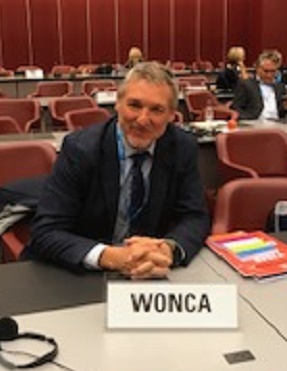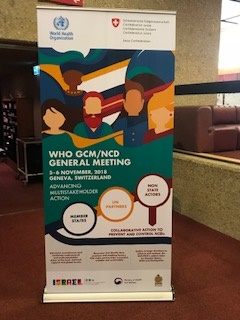General Meeting of the WHO Global Coordination Mechanism on the Prevention and Control of NCDs
 español
español
Domingo Orozco-Beltrán, WONCA Special Interest Group on NCDs convener, reports on the General Meeting of the WHO Global Coordination Mechanism on the Prevention and Control of Noncommunicable Diseases (GCM/NCD) held in Geneva, 5-6 November 2018
In November 2018, the Government of Switzerland and WHO, coorganized a General Meeting of the WHO GCM/NCD and WONCA was invited to participate.
The General Meeting of the WHO Global Coordination Mechanism on the Prevention and Control of Noncommunicable Diseases (GCM/NCD) is a global Member State-led coordinating and engagement platform, established in 2014 by the World Health Assembly to help counteract the growing global health threat of noncommunicable diseases (NCDs).
Objectives of the General Meeting
• To highlight action and progress made in mobilizing multisectoral and multistakeholder partnerships to share knowledge, expertise, technology and financial resources to complement the efforts of national Governments towards achieving the nine voluntary global targets of the WHO Global Action Plan on NCDs (2013-2020) and the NCD- (SDG 3.4) and NCD-related targets of the 2030 Agenda;
Comment. - Many people from different multi-sectoral and multi-stakeholder partnerships but few comments about the need of a strong PHC especially in developing countries. The majority of participants focused their talks on public health measures / experiences (smoking cessation, dietary habits, exercise, environment, drugs budget).
• To promote and take stock of commitments and pledges made by non-State actors to support national efforts for NCD prevention and control;
Comment. - Few words about how to prevent and control NCDs from PHC. No comments about therapeutic adherence, disease control of cardiovascular risk factors. Many differences in the type of NCDs from developing countries (infectious diseases, poverty) to developed countries.
• To showcase and identify best practices and enabling factors that make partnerships successful, scalable and sustainable;
Comments. - Best practices come from the political and public health point of view. As an example the reduction in 40% of the budget for cancer drugs in Colombia through an agreement with pharmaceutical companies. Other examples were the reduction in sugar in some beverages; the reduction of salt, etc.
• To highlight the key role of the health sector as a steward for policy coherence and universal health coverage for NCDs;
Comments. - Special efforts are needed all over the world to assure universal coverage for NCDS. This is a political action needed. But no were comments about the key role of PHC in this action.
• To call for increased cooperation between Governments and non-State actors, including the private sector, to accelerate country-level action, while avoiding duplication of efforts and potential conflicts of interest;
Comments. - It is important that there were different actors in the Conference, including Governments, private sector, and non-state actors.

Expected Outcomes
• Greater understanding of the GCM/NCD’s value to help Member States and non-State actors to accelerate the implementation of the commitments delineated in high-level political declarations and outcome documents, 2030 Agenda for Sustainable Development and the WHO Global Action Plan 2013-2020 at global, regional national and local levels;
Comments. - One of the main results of this Conference is to improve understanding of the GCM/NCDs value for Governments, But it's necessary to put PHC as an important key to improve NCDs control in all countries.
• Increased ownership of the GCM/NCD by its Participants as a platform to increase awareness, encourage innovation, advance multi-sectoral action, advocate for resource mobilization, share best practices and forge partnerships to enhance the NCD prevention and control at all levels;
Comments. - Best practices from PHC were not shown. We have several countries in the world with very good experience of how to develop PHC and how this strategy improves NCDs control , accessibility and equity to health system, through universal health coverage. Spain is a good example of it. Unfortunately, Spain and many other developed countries were not represented in the conference. It is necessary to input experiences from different countries and health systems with a strong PHC. Spain could be a reference from all countries in South America. WONCA could be the way to do it, making reports about PHC in different countries and making courses in different languages to show how PHC can be improved.
• Increased multi-stakeholder and multi-sectoral dialogue and communication on how to capitalize on each stakeholder’s strength for accelerating action towards SDG 3.4 and improved accountability;
Comments. - Improving NCD management probably implies inclusion of mulitpe stakeholders from different sectors. It is not easy to do but this Conference is a good way for this approach.
• Agreement on the future strategic directions of the GCM/NCD, taking into account the preliminary results of the GCM/NCD evaluation, outcomes of the UNGA third High-level Meeting on NCDs, and the WHO 13th General Programme of Work.
Comments. – The future strategic directions are focused on the political and public health point of view. I think it is necessary to reinforce the key role of PHC to improve NCD management.
Conclusions
• To improve NCD management implies to include multiple stakeholders from different sectors. It is not easy to do but this Conference is a good way for this approach.
• The future strategic directions from GCM/NCD are focused on the political and public health point of view. It is necessary to reinforce the key role of PHC to improve NCD management.
• Best practices from PHC were not shown. It is necessary to put in value experiences from different countries and health systems with good PHC. Spain could be a reference from all countries in South America. WONCA could be the way to do it, making reports about the PHC in different countries and making training courses in different languages to show how NCDs can be improved through PHC. But it is necessary economic support to do it.